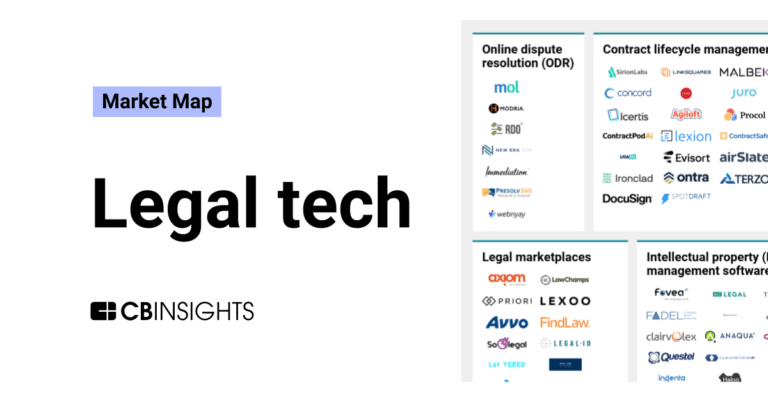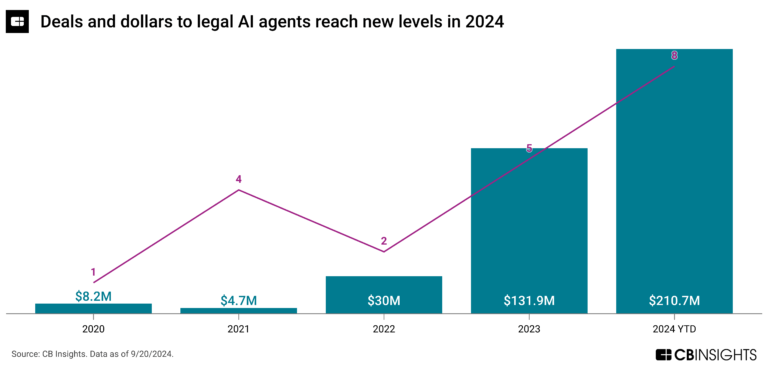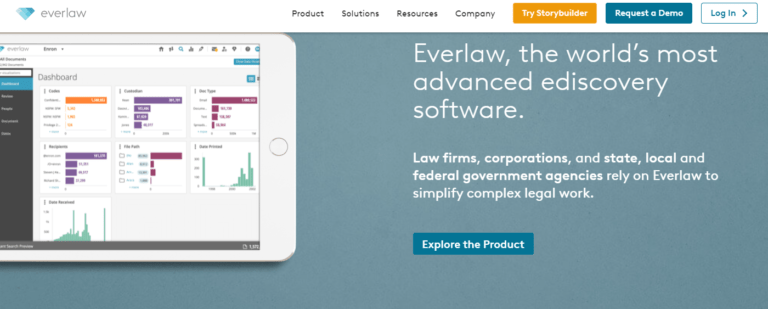
Clio
Founded Year
2008Stage
Series F | AliveTotal Raised
$1.316BValuation
$0000Last Raised
$900M | 2 mos agoMosaic Score The Mosaic Score is an algorithm that measures the overall financial health and market potential of private companies.
+70 points in the past 30 days
About Clio
Clio provides software solutions for the legal industry. The company offers a suite of tools that facilitate law practice management, client intake, billing, and document management, designed to streamline operations for legal professionals. It products are help the law firm productivity and client services, adhering to legal industry compliance standards. It was founded in 2008 and is based in Burnaby, Canada.
Loading...
ESPs containing Clio
The ESP matrix leverages data and analyst insight to identify and rank leading companies in a given technology landscape.
The legal document management market provides software solutions for creating, organizing, storing, and managing legal documents and files. These solutions offer features such as document capture, indexing, version control, search functionality, and secure access controls. Legal document management systems help streamline workflows, enhance productivity, and ensure compliance with legal regulation…
Clio named as Leader among 12 other companies, including OpenText, airSlate, and Casetext.
Loading...
Research containing Clio
Get data-driven expert analysis from the CB Insights Intelligence Unit.
CB Insights Intelligence Analysts have mentioned Clio in 3 CB Insights research briefs, most recently on Sep 20, 2024.

Oct 10, 2023
The legal tech market mapExpert Collections containing Clio
Expert Collections are analyst-curated lists that highlight the companies you need to know in the most important technology spaces.
Clio is included in 2 Expert Collections, including Unicorns- Billion Dollar Startups.
Unicorns- Billion Dollar Startups
1,244 items
Tech IPO Pipeline
257 items
The tech companies we think could hit the public markets next, according to CB Insights data.
Clio Patents
Clio has filed 30 patents.
The 3 most popular patent topics include:
- electrotherapy
- implants (medicine)
- neurophysiology

Application Date | Grant Date | Title | Related Topics | Status |
|---|---|---|---|---|
1/23/2017 | 5/4/2021 | Stem cells, Transcription factors, Developmental biology, Biotechnology, Cardiac arrhythmia | Grant |
Application Date | 1/23/2017 |
|---|---|
Grant Date | 5/4/2021 |
Title | |
Related Topics | Stem cells, Transcription factors, Developmental biology, Biotechnology, Cardiac arrhythmia |
Status | Grant |
Latest Clio News
Jul 30, 2024
Share A few days ago, Clio announced its US$ 900M Series F . The funding round was one of the largest capital raises for a vertical software company and the largest software financing round in Canadian ever. Point Nine led Clio’s seed round in early 2009, so we’re fortunate to have been shareholders for most of the company’s history. When we invested, Clio had around 50 customers and a few thousand dollars in MRR. Today, Clio is used by more than 150,000 legal professionals, has crossed $200 million in ARR, is endorsed by more than 100 law societies and bar associations worldwide, and has more than 1,100 employees. In this post I’d like to look back at Clio’s truly amazing 16-year journey and share a few learnings that might be relevant for founders or investors. 1) Some of the best companies start outside of the Bay area It seems obvious now, but when Clio started out, the idea that world-class companies could emerge from outside the Bay Area wasn’t widely accepted. Back then, European and Canadian startups had a very hard time raising capital. A good example is Zendesk, where we didn’t manage to raise a Series A in Europe. Those days are, fortunately, long gone. The financing landscape has changed dramatically, making it much easier to raise capital from anywhere in the world. Of course, there are still big differences between the SF Bay area and smaller tech ecosystems. The Bay area and other tech hotspots continue to produce amazing companies, and being in one of these regions still offers unique advantages (access to the largest talent pools, close proximity to early adopters, a rich ecosystem of experienced mentors,..). What makes many companies from other places so interesting is that because the founders are not part of the tech echochamber and because they are exposed to different types of industries and companies, they work on different problems. Our portfolio company Laserhub , for example, has built the first fully integrated platform for the procurement of customized metal parts. Laserhub is based in Stuttgart, which is home to Daimler-Benz, Porsche, and thousands of small to mid-sized metal processing companies. It’s a $XXB+ industry, but if you haven’t grown up in an area like Stuttgart, it’s unlikely that you’ve had the type of industry expertise that led Adrian to start the company. Similarly, no one in Silicon Valley was thinking about software for lawyers in 2008. The analogy with Laserhub isn’t perfect because there is no shortage of lawyers in California. But apparently, SaaS for lawyers wasn’t top of mind for Bay area founders at that time, maybe because vertical software wasn’t en vogue with Silicon Valley VCs in 2008. 2) Some of the best companies don’t follow the T2D3 path For many years, investors were obsessed with the T2D3 growth path . When the 2022 downturn started, investors began to take a more balanced view, valuing efficiency over growth at all costs. However, hyper-growth is still the #1 thing that gets investors excited. Since returns are driven by power law, that’s understandable. Especially for larger funds, it’s hard to generate top-quartile returns without being in one of the few-in-a-generation companies like Wiz, which grew from 0 to $500M ARR in four years. The reality is that very, very few companies can sustain this type of explosive growth over an extended period. Attempting to force it often leads to failure. As I wrote some years ago , the good news is that growing a little slower is not the end of the world. If you have a great product with high NPS, low churn, and an excellent position in your market segment, you have a decent chance of getting to $100M in ARR even if your growth rate starts dropping significantly below 100% year-over-year at around $10M in ARR. It just takes a few more years. Except for the first few years, Clio never grew at 100% year-over-year. However, Clio has unusually high growth persistence, i.e. its growth rate didn’t go down much with increasing scale. In fact, the company even accelerated its growth in the last few years, disproving the Mendoza line idea , or at least being an exception to the rule. While many hyper-growth companies have experienced massive slowdowns in recent years, Clio has not. One of the reasons is that hyper-growth was often fuelled by spending huge amounts on sales and marketing. So when these expenditures are cut back in a downturn, growth plummets. Clio never relied on excessive sales and marketing spend in the first place, so they didn’t have to cut back. Another excellent example is Procore, the leading software platform for the construction industry. It took Procore 13 years to reach $10 million in revenue, so it was anything but a rocket ship. But then, in the following eight years, they grew from $10M to almost $900M. 3) The best companies all require huge persistence I’m sure you’ve heard this many times before, but it’s worth repeating: the best companies all require huge persistence. Many founders would have given up before Procore reached $10 million in revenue, and surely most VCs would have abandoned a company with Procore’s early growth trajectory. Not every startup idea is worth pursuing indefinitely. I’m not arguing for founders to keep going forever if things don’t work out. If an idea doesn’t work, you’ve pivoted once already, there’s no clear opportunity or market pull, it’s okay to give up. Life is too short. And don’t worry about losing money for your VCs; that’s baked into the model. What I mean is that every company I know that made it big and looks like a huge success from the outside faced existential crises in the early days. And it doesn’t necessarily get better when you’re bigger. You just have different (and maybe bigger) problems. A journalist recently asked me, “What made Clio win?”. My answer was that it began with Jack and Rian having the right insight at the right time. They knew what to build, for whom, and had the capability to build it. But ultimately, the #1 factor behind Clio’s success was their persistence. They faced numerous challenges and crises but never gave up. 4) Vertical software companies can become much larger than most people thought For many years, most VCs didn’t want to touch vertical SaaS companies with a yardstick due to TAM concerns. What they’ve missed: a) Higher market share b) Ever-increasing ARPAs Vertical SaaS companies can continually increase their average revenue per account through what’s become known as the layer cake strategy. What this means is that you continuously add not only new features, but new products, services and revenue streams. Louis goes into more detail here . Clio began as practice management software for solo lawyers, offering a simple solution for time tracking, billing, and document management. Sixteen years in, it has become a true industry operating system, powering not every aspect of the legal process including client intake, client communication, court filings, accounting, and much more. How it started vs. how it’s going What’s more, Clio’s roadmap is as long as it’s ever been and there are no signs of deceleration at $200 million in ARR. Clio will keep adding layers to the cake, while also doubling down on its rapid market expansion upmarket and internationally. Similarly, Procore, after more than 20 years, has captured less than 12% of its TAM in the US and less than 2% worldwide. The numbers are similar for other vertical SaaS winners like Toast, ServiceTitan, and Shopmonkey. These companies illustrate that the potential for vertical SaaS is much, much larger than most people thought 10–15 years ago. 5) The best companies write their own playbooks Today there’s a well-understood playbook for vertical SaaS. You can find it on the Internet. ;-) When Clio started, there was no playbook. Clio co-authored that playbook alongside a few other pioneering vertical SaaS companies of its generation. Similarly, when Zendesk began, there was no playbook for consumerized software and PLG. Zendesk, along with a few other SaaS companies that emerged between 2006–2009, helped create this playbook. What does this mean for companies starting today? Founders should understand and leverage the playbooks that guided the success of the previous generation. Much of that knowledge remains highly relevant. But the best founders will go beyond these established frameworks and write the playbook for the next generation. Don’t take this as advice to reinvent everything. There are many things I think founders shouldn’t try to reinvent. Don’t try to innovate when it comes to structuring an ESOP or sales compensation. Focus on innovation in product and GTM. 6) The best companies and investments are non-consensus and (eventually) right You’ve probably heard it before, but I’ll mention it briefly because it’s so important. The idea goes back to Andy Rachleff, co-founder of Benchmark, who said that “in order to create something legendary, you have to have an insight that is non-consensus and right”. Imagine a 2x2 matrix. On one dimension, you can be right or wrong. On the other dimension, you can be consensus or non-consensus. If you are wrong, you will fail, no matter what. But it turns out that just being right is not enough. There is one square you want to be in. And that is the square that is non-consensus and right. Most people don’t realize that if you are in the right and consensus square, you will usually not achieve greatness. Your startup might have a good idea, but if it’s too obvious, multiple me-too competitors will get funded by me-too VCs. As competition floods the market, prices erode, and sales cycles lengthen. And the exit options become less attractive. The path to greatness is to be non-consensus and right. Being non-consensus and right affords the startup the time to survive, adapt, and succeed after trial and error without fatal consequences. No one preys on them because no one believes their idea is important. This gives the startup time to master differentiable and specific skills and build strengths for inevitable competitive battles that will come in the future. When you’re starting out, it’s way better if your potential competitors don’t care about what you’re doing. When we invested in Clio in early 2009, nobody wanted to invest. And vertical software was so unsexy that it took years before the first serious competitors emerged. Like Andy Rachleff said, this gave Clio the time to survive, adapt, succeed after trial and error, and eventually dominate the market. 7) The best tech companies are founder-led by a highly technical founder Jack co-founded Clio with his co-founder Rian in 2008. Sixteen years later, Jack is still leading the company as CEO and he’s poised to continue for many more years, which is one of the reasons why we’re so excited about the future of the company. There are exceptions, but based on our experience with companies like Clio, Zendesk, Jobber, Docplanner, and Brainly, we aim to invest in companies where (a) we think the founders can lead for many years or decades and (b) they are excellent technologists. One reason is that the best startups are so ahead of their time that even after ten or more years, they’ve only realized a fraction of their original product vision. To keep advancing, the founder’s vision is crucial. Another reason is that if there are sudden market or technology shifts (like with LLMs), you need leaders who deeply understand the technology and its implications and can adapt quickly. It’s hard for a hired CEO to do what Des Traynor did at Intercom when ChatGPT came out — refocus a large part of the company on AI, almost overnight.
Clio Frequently Asked Questions (FAQ)
When was Clio founded?
Clio was founded in 2008.
Where is Clio's headquarters?
Clio's headquarters is located at 4611 Canada Way, Burnaby.
What is Clio's latest funding round?
Clio's latest funding round is Series F.
How much did Clio raise?
Clio raised a total of $1.316B.
Who are the investors of Clio?
Investors of Clio include Technology Crossover Ventures, JMI Equity, OMERS Private Equity, Sixth Street Growth, New Enterprise Associates and 12 more.
Who are Clio's competitors?
Competitors of Clio include Filevine, Everlaw, LexDock, Headnote, Case.one and 7 more.
Loading...
Compare Clio to Competitors
LexDock is a cloud-based legal management platform that operates in the legal services industry. The company offers a comprehensive suite of tools for legal matter management, project tracking, collaboration, billing, document retention, and performance analytics designed for businesses and attorneys. LexDock primarily serves sectors such as retail, logistics, hospitality, transportation, services, software, manufacturing, and construction. It was founded in 2018 and is based in Tampa, Florida.
Docket provides a centralized platform for legal teams. It centralizes matter intake, manages departmental collaboration, and gains deep analytics into the legal department. The company's platform tracks team key performance indicators (KPIs) and key matter data, prepares for board meetings as well, and helps to make data-driven decisions about legal spending, enabling clients to manage workload and generate reports automatically. It was founded in 2019 and is based in San Francisco, California.

LEAP Legal is a company that focuses on providing legal practice management software solutions. The company offers a cloud-based platform that enables law firms to manage their operations, including document assembly and management, legal publishing, legal accounting, case management, time tracking, and billing. The company primarily serves the legal industry. It was founded in 1992 and is based in Jersey City, New Jersey.
Dazychain is a company that focuses on providing software solutions in the legal tech industry. The company offers a cloud-based legal matter management system that supports various aspects of legal operations, including intake, triage, document management, reporting, external panel management, collaboration, knowledge management, risk and contract management. Dazychain primarily sells to corporate legal departments. It was founded in 1995 and is based in Melbourne, Victoria.

Filevine is a company that focuses on providing legal work platform solutions in the legal technology industry. The company offers a range of services including case management, document management, contract management, and business analytics, all designed to simplify and streamline legal work. Filevine primarily serves the legal sector, with a particular focus on law firms and corporate legal departments. It was founded in 2017 and is based in Salt Lake City, Utah.
LEX247 is a company that focuses on providing cloud-based legal practice management software in the legal tech industry. The company offers a platform that allows law firms to manage cases, track time, communicate with clients, issue invoices, and integrate with other applications for seamless workflow management. The primary customers of LEX247 are law firms of various sizes, from small and medium-sized firms to large national and international law firms. It was founded in 2015 and is based in Stockholm, Sweden.
Loading...

